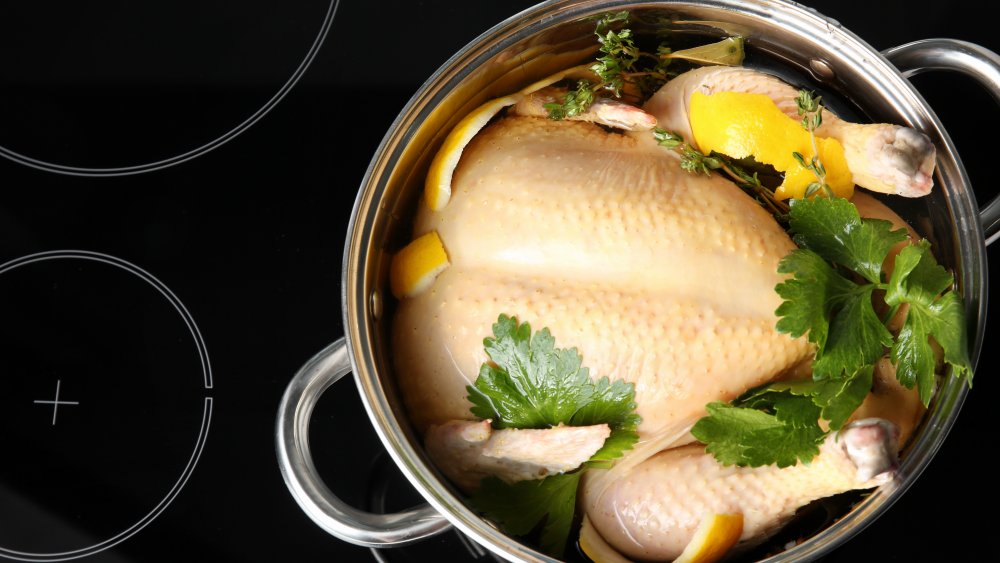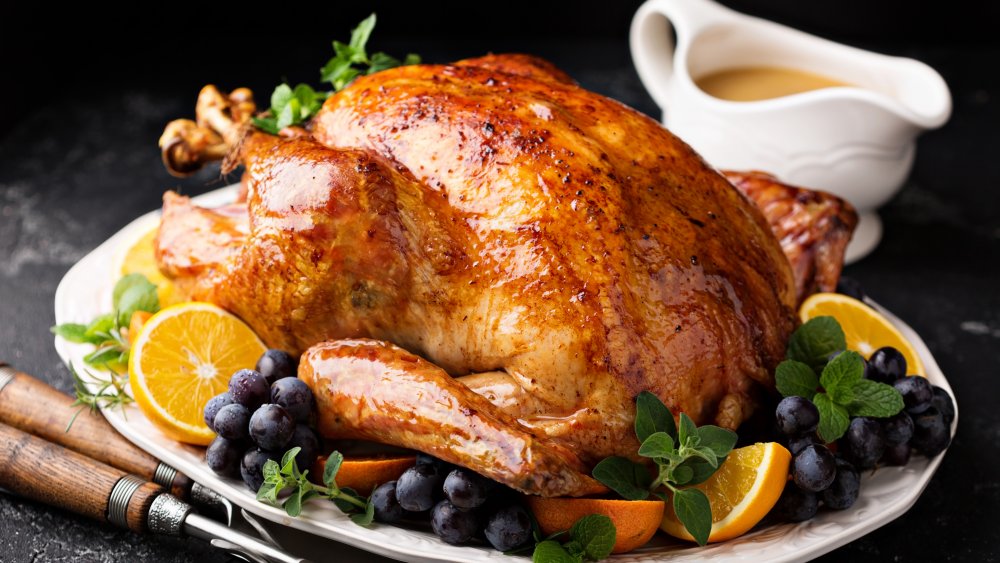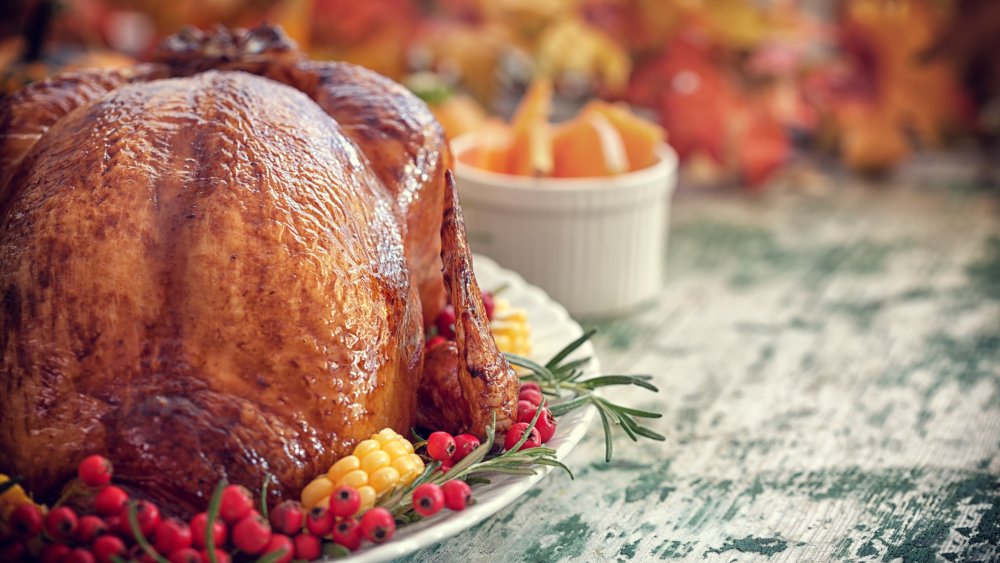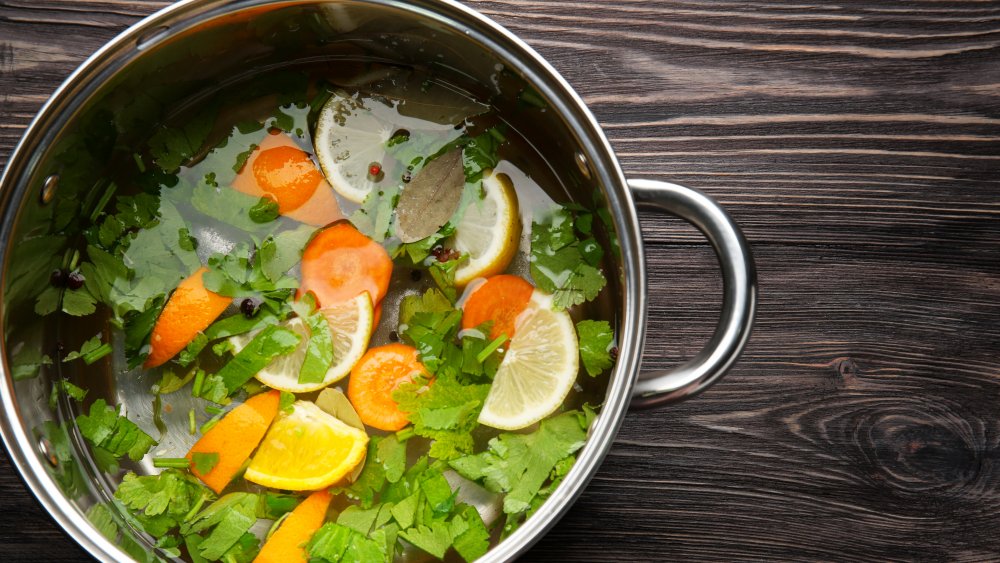The One Step You Shouldn't Skip When Prepping A Turkey
There's a lot of options out there when it comes to cooking that Thanksgiving Day bird, and... well, having a ton of choices isn't necessarily a good thing. Sure, options are great, but so many choices can make an already stressful day even more overwhelming. Anyone who has hosted Thanksgiving knows what kind of pressure comes with it, and it doesn't matter if there are two guests or 22, the stress is real. Especially when it comes to the big moment: cutting into that turkey. Will it live up to the delicious smells filling the house? What's a host to do to guarantee it's a resounding "yes"?
What should you be doing to your turkey?
Let's start at the beginning. Before you even think about stuffing or no stuffing, how long it's going to have to be in the oven, and how on earth you're going to get those pies and potatoes done, too, there's the lead-up to the big day. If you're like many, you probably pick up a frozen turkey and then stress about getting it unfrozen enough to cook in a timely fashion — and here's where this important step comes in. According to Alton Brown, his favorite, go-to method of preparing a turkey is to brine it first.
And Alton Brown is pretty much a culinary genius.
He says that the benefits of brining start long before you even turn the oven on, and it's pretty much the best way to not only thaw your turkey, but free up space in your fridge.
Gone are your days spent trying to work around the turkey that's taking up a huge amount of space in your fridge. Brown says you simply stick the frozen turkey in a cooler, put it in a cool environment — like the basement or the garage — and cover it with brine (never letting the temperature of the liquid rise above 40 degrees for safety's sake, of course). It'll thaw, your fridge will stay spacious, and you won't be struggling to find a place for all those other Thanksgiving goodies. Brilliant, right?
What are the other benefits of brining your turkey?
As if making the days leading up to Thanksgiving a little easier isn't enough reason to brine, let's talk about the other benefits. Chef Josh Capon says (via the Huffington Post) that brining is going to keep your turkey moist; turkeys are big and bulky and take a long time to cook, after all, and that means there's a good chance they're going to dry out. Brine it first, and you'll no longer need to use gravy as a practical way of hiding how dry your bird ended up.
A dry bird isn't a reflection of your cooking skills at all. It's just a difficult thing to cook. According to Martha Stewart, it all has to do with the size and composition of the notoriously lean bird. The dark meat is going to take longer to cook, and by the time you've got that up to temp (and safe), the white breast meat is dry. While soaking it in brine will give it a little extra moisture, there's actually a sweet spot when it comes to brining. She says that if you let it soak too long, you're going to end up with meat that's a bit spongy... and that might be worse than a dry turkey.
So, how do you brine a turkey?
There's a ton of options when it comes to making your brine, but here's the basics (via Rachael Ray): Dissolve 1 cup salt and 1 cup brown sugar in 6 quarts cold water (for a 12 to 14 pound turkey). Submerge your bird, add more water as needed to cover, and let it sit — preferably in Alton Brown's suggested cooler. Not hard, right?
Now, let's talk variables.
The Huffington Post suggests you should plan to let your turkey brine for about one hour per pound, and that will prevent that spongy meat problem. Simple enough. But here's where the fun begins — there's no reason to use just sugar and salt. Flavoring your brine will take it to the next level, and there's a ton of ideas on how to do it. Brown adds allspice berries, ginger, and peppercorns to his brine, swapping out vegetable stock for water.
There's no need to stop there. What about coriander and mustard seeds? Red pepper flakes or dried chilis? A dash of soy, some garlic, or sage and rosemary? You can make your brine with any flavor profile you'd like. Your turkey will surely impress this Thanksgiving, and all it takes is a little creativity.



